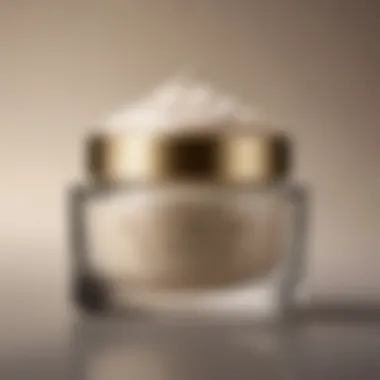Best Night Creams for Mature Skin: A Complete Guide


Intro
As skin ages, it undergoes various changes that can affect its tone, texture, and overall appearance. The natural reduction in collagen and the slowing of cellular regeneration often lead to dryness, sagging, and fine lines. For many women, a targeted night cream can provide significant support in addressing these aging concerns. This guide aims to dissect the essential elements in selecting the best night cream for older skin, diving into the importance of hydration, nourishment, and ingredient efficacy.
With an ever-growing market saturated with options, understanding how to navigate through the selection process is crucial. This article will empower you with knowledge about various ingredients and their functions, as well as how to integrate these products into a comprehensive nighttime skincare routine. By doing so, you will be better equipped to make informed choices tailored to your skin's unique needs and preferences.
Understanding Mature Skin
Understanding mature skin is crucial for those seeking effective skincare. As individuals age, their skin undergoes significant changes. These transformations can affect texture, appearance, and overall health. Recognizing these changes allows one to make informed decisions about product selection and skincare routines.
Mature skin typically shows signs such as wrinkles and fine lines, loss of elasticity, uneven skin tone, and increased dryness. The importance of understanding these characteristics cannot be overstated; it informs the choice of night creams that specifically target these issues. Using the right products tailored to mature skin can enhance overall skin vitality, ensuring that it remains hydrated and nourished.
Characteristics of Older Skin
Older skin tends to have distinct attributes compared to younger skin. The following points outline the primary characteristics:
- Decreased Collagen Production: Collagen is essential for skin structure. As its production slows, skin becomes less firm.
- Thinner Epidermis: The outer layer of skin becomes thinner, leading to an increased appearance of imperfections.
- Reduced Lipid Levels: Natural oils diminish over time, contributing to dryness.
- Slower Cell Renewal: Skin turnover rate decreases, leading to a dull appearance.
Common Skin Concerns
Mature skin presents various concerns. Each issue requires targeted approaches for management. Here are common skin problems:
Wrinkles and Fine Lines
Wrinkles and fine lines are perhaps the most recognized indicators of aging skin. They appear due to repeated facial movements and the natural loss of moisture. In this article, wrinkles and fine lines are critical as they directly affect the confidence and self-image of individuals. Night creams that contain ingredients like retinol can promote skin renewal and reduce these visible signs.
- Key Characteristic: They signify loss of skin elasticity, making solutions aimed at smoothening essential.
- Unique Feature: Targeted treatments can visibly improve skin texture. The focus is not just on elimination but also prevention for future development.
Lack of Elasticity
The skin's elasticity diminishes with age, leading to sagging. Loss of elasticity contributes to an overall tired appearance. This characteristic is vital to address, as younger skin typically has a supple, firm look.
- Key Characteristic: As the skin loses elasticity, it may develop drooping areas.
- Unique Feature: Products containing peptides can stimulate collagen production, offering beneficial results in restoring firmness.
Uneven Skin Tone
Uneven skin tone can manifest as dark spots and discoloration. This issue often arises from sun damage and hormonal changes. Addressing uneven skin tone is significant as it affects the overall appearance and can lead to skin concerns if ignored.
- Key Characteristic: It provides insight into the skin’s history, revealing past sun exposure and care.
- Unique Feature: Treatments aimed at lightening spots, like those with vitamin C, offer a chance to restore skin radiance.
Dryness and Dehydration
Dryness and dehydration are prominent in mature skin. They are not only uncomfortable but also enhance the visibility of wrinkles and fine lines. Understanding the causes can lead to better hydration solutions.
- Key Characteristic: Dull and rough texture often arises from insufficient moisture.
- Unique Feature: Ingredients like hyaluronic acid can significantly improve hydration levels, making them crucial in any night cream for mature skin.
Understanding these characteristics and concerns of mature skin enables a comprehensive approach to skincare. Formulating a tailored routine with the right products can yield noticeable improvements in skin health and appearance.
The Role of Night Creams


Night creams play a significant role in skincare, especially for older skin. As the skin matures, it undergoes various changes. These changes can lead to different concerns, such as dryness, wrinkles, and a lack of firmness. Night creams are formulated to address these issues, providing hydration, nourishment, and protection during the nighttime when the skin is in repair mode.
Using a night cream can significantly enhance the overall appearance and health of older skin. The primary benefit lies in their rich formulations that contain active ingredients that support skin repair and rejuvenation. These creams allow your skin to absorb beneficial components while you rest, optimizing skin health. Additionally, they create a barrier that can lock in moisture, preventing the skin from becoming dehydrated overnight.
Why Use a Night Cream?
Featuring distinct benefits, night creams serve a specific purpose in a skincare routine. They are generally thicker than day lotions, designed to provide sustained hydration and treat various skin issues. In a demographic like older women, maintaining moisture is critical, as skin tends to lose its ability to retain water with age.
Some of the key reasons to include a night cream in your regimen include:
- Intensive Hydration: Night creams often contain heavier moisturizers that work to lock in hydration, minimizing dryness.
- Targeted Treatment: Many night creams are developed with active ingredients like retinol or peptides. These ingredients work effectively to combat fine lines and promote cell turnover.
- Enhanced Repair: While you sleep, skin repair processes are more active. Night creams are crafted to boost this natural mechanism, facilitating rejuvenation.
How Night Creams Work
Night creams function primarily through the combined action of several high-quality ingredients. These creams are specially designed to work at night when the skin is most receptive to treatment. Active ingredients penetrate deeper into the skin, providing nourishment and support.
The mechanism can be summarized as follows:
- Penetration of Active Ingredients: The thick texture allows active components to penetrate more effectively into the skin.
- Moisture Retention: Night creams create a barrier that protects from moisture loss and keeps the skin hydrated longer.
- Cell Regeneration Support: Ingredients such as retinol can stimulate cell turnover, renewing the skin and improving texture.
Night creams bring a wealth of benefits tailored for mature skin, making them an essential addition to your skincare.
By focusing on ingredients that support repair and hydration, these creams ensure skin receives the necessary nutrients for optimal health overnight.
Key Ingredients to Look for in Night Creams
Choosing the right night cream for older skin involves understanding the key ingredients that can contribute positively to skin health. As skin matures, it often exhibits specific needs that require targeted ingredients. The right components can help combat issues such as wrinkles, loss of elasticity, and dehydration. Understanding what these ingredients do can inform better choices in selecting a suitable night cream.
Retinol and Its Benefits
Retinol is a derivative of vitamin A known for its anti-aging properties. It promotes cell turnover, which helps in reducing the appearance of fine lines and wrinkles. When used regularly, retinol can enhance skin texture and tone, making it appear more youthful and vibrant. However, it is crucial to start with a lower concentration if you are new to retinol, as it can cause irritation in some skin types. Gradually increasing usage as your skin adjusts is advisable to maximize benefits without adverse reactions.
Peptides for Skin Repair
Peptides are short chains of amino acids that play a significant role in skin repair and restoration. They signal the skin to boost its natural production of collagen and elastin, both essential for maintaining firm and supple skin. Night creams containing peptides can help in reducing sagging and improve overall skin structure. Their reparative nature is particularly beneficial for mature skin, aiming to restore resilience and elasticity.
Hyaluronic Acid for Hydration
Hyaluronic Acid is revered for its exceptional ability to retain moisture. It can hold up to 1,000 times its weight in water, which contributes significantly to skin hydration. Proper hydration is vital for older skin as it tends to become dry and flaky. Incorporating hyaluronic acid into your night routine helps to plump the skin and minimize the appearance of lines. It is often recommended to look for formulations that feature this ingredient prominently for optimal hydration effects.
Antioxidants and Their Importance
Antioxidants are crucial in neutralizing free radicals that can cause oxidative stress, leading to premature aging. Ingredients like vitamin C, E, and green tea extract provide protection against environmental stressors. They also promote a brighter and more even skin tone. The presence of antioxidants in night creams can aid in the repair process as the skin regenerates during sleep, making it an essential component for those with aging skin concerns.
Using products rich in antioxidants can significantly reduce the signs of aging by protecting skin cells from daily damage.
In summary, selecting a night cream that contains these key ingredients—retinol, peptides, hyaluronic acid, and antioxidants—can greatly enhance the overall appearance and health of older skin. It is important to tailor your choice based on individual skin needs, aiming for effective solutions that nourish, repair, and hydrate.
Selecting the Best Night Cream
Choosing the best night cream for older skin is crucial for maintaining youthful and healthy skin. Night creams play a significant role in replenishing moisture, repairing skin damage, and addressing specific concerns that come with aging. As skin matures, its ability to retain moisture decreases. Hence, selecting the right night cream becomes a necessity rather than a luxury. A good night cream should provide hydration, nourishment, and targeted treatment for common aging issues.


Assessing Skin Type
Oily Skin Considerations
When dealing with oily skin, you need to be mindful of the formulations you select. Oily skin can produce excess sebum, making it essential to look for lightweight options that control oil without stripping necessary moisture. A gel-based night cream or one with non-comedogenic ingredients is often a beneficial choice. These formulations help maintain hydration without clogging pores, thus preventing breakouts. Also, ingredients like salicylic acid can aid in balancing oil production.
Dry and Sensitive Skin Approaches
For those with dry and sensitive skin, the choice of night cream should focus on deep hydration and soothing properties. Look for creams containing ceramides, glycerin, or aloe vera, which can restore moisture and strengthen the skin barrier. These formulations help in reducing redness and irritation while providing a comforting feel on the skin. However, it is important to avoid potential irritants like alcohol and fragrance that could worsen sensitivity.
Combination Skin Solutions
Combination skin presents its own challenges, requiring a versatile approach. A night cream that balances hydration while addressing specific areas of concern—such as dryness on the cheeks and oiliness on the forehead—is ideal. Lightweight creams that offer hydration but also include mattifying properties work well for this skin type. It ensures the skin feels comfortable without the risk of exacerbating oily areas while providing adequate moisture where it is needed.
Personal Preferences
Texture and Consistency
The texture and consistency of a night cream are critical factors to consider. Some may prefer a rich creamy texture that feels luxurious and provides a barrier against moisture loss, while others might opt for a lighter serum-like formulation that absorbs quickly. This choice can impact how you feel about using the product consistently. Creams with a smooth texture can enhance the application experience, but if too heavy, they might feel uncomfortable.
Scent and Fragrance-Free Options
Fragrance can be a significant concern, especially for sensitive skin types. Choosing scent and fragrance-free options helps to minimize the risk of irritation caused by synthetic fragrances. Night creams without added scents typically focus on nourishing ingredients rather than cover-ups, making them a more suitable choice for those with allergies or sensitivities. These options often promote better tolerability while still delivering genuine skincare benefits.
Remember, selecting a night cream is not just a matter of preference but also of understanding the unique needs of your skin. This choice can determine the effectiveness of your skincare routine.
Integrating Night Cream into Your Routine
Integrating night cream into your skincare routine is a pivotal step for older skin. As skin ages, it requires more targeted care to address specific concerns like wrinkles and dryness. Night creams are specially formulated to work while you sleep, offering hydration and nourishment. When incorporated correctly, these creams can significantly improve skin texture and appearance.
When to Apply Night Cream
Applying night cream at the right time can maximize its benefits. Generally, it is best used after cleansing and any serums. The skin is more receptive to products in the evening, as it focuses on repair during this time. To effectively incorporate it into your routine, consider these steps:
- Cleansing: Start with a gentle cleanser to remove impurities.
- Serums: Follow up with any targeted treatment serums.
- Night Cream: Finally, apply your chosen night cream, ensuring even coverage.
Following this order optimizes absorption and efficacy. Setting a specific time in the evening makes it a consistent part of your routine, enhancing its overall effectiveness.
Layering with Other Products
Layering products appropriately is essential for achieving desired results. Each product serves a unique purpose, contributing to overall skin health. Find below an exploration of key products often layered with night cream.
Serums
Serums are a concentrated source of active ingredients and penetrate deeply. Their key characteristic is the lightweight formulation, allowing for quick absorption into the skin. This quality makes serums a popular choice before applying night cream. Commonly, serums target specific issues like dark spots or enhanced hydration. They can contain high doses of ingredients such as Vitamin C or hyaluronic acid.
Advantages: Using a serum boosts the effectiveness of your night cream, providing enhanced results. It prepares your skin for deeper hydration and repair.
Moisturizers
Moisturizers play a vital role in providing hydration. They have a thicker consistency, helping to lock in moisture. While night creams provide restorative benefits, adding a moisturizer can enhance hydration levels, especially for drier skin types. This combination can make a significant difference in skin appearance the next morning.


Advantages: The use of a moisturizer can prevent moisture loss during the night. It smooths the skin’s surface and creates a barrier against environmental factors.
Face Oils
Face oils are often the final step in a nighttime routine. They are composed of essential nutrients and can add an extra layer of moisture. Oils like argan or jojoba are popular choices due to their nourishing properties. Their key characteristic lies in their lipid-rich formulation, which helps lock in previous layers of skincare.
Advantages: Face oils can enhance the overall effectiveness of your nightly routine. They provide additional hydration and can improve the skin’s barrier function.
Common Mistakes to Avoid
Mistakes when choosing and using night creams can hinder the skincare routine, especially for older skin that requires careful attention. Understanding these errors can enhance the effectiveness of a night cream and promote better skin health. Below are the key pitfalls to stay away from in your skincare endeavors.
Overusing Products
Applying too many products can overwhelm the skin. Many people think that more product equals better results, which is often incorrect. The skin has a natural barrier that can be disrupted by excessive layering. This disturbance may lead to irritation, breakouts, or a dull appearance.
When it comes to night creams, a single effective product tailored to your skin type generally suffices. For example, a well-formulated night cream can include active ingredients that hydrate, repair, and nourish without the need for multiple serums or heavy moisturizers. Concentrate on quality over quantity.
Ignoring Skin Sensitivities
Each person's skin reacts differently to various ingredients. Ignoring skin sensitivities can result in adverse reactions, ranging from mild irritation to severe allergic responses. Always test a new product on a small area before fully incorporating it into your routine.
Older skin may be more susceptible to irritation due to a thinner epidermal barrier. It is crucial to select night creams with calming components, such as aloe vera or chamomile. Pay attention to how your skin responds, and adjust accordingly.
Evaluating Results
Evaluating the results of using a night cream is a critical component in skincare, especially for older skin. As time progresses, skin changes and evolves, necessitating adjustments to skincare routines. Monitoring these changes helps determine if the chosen night cream is effective or if a different approach is needed. Furthermore, understanding results aids in identifying specific skin needs that might require additional attention.
By taking note of the skin's response to the nightly regimen, one can discern patterns that could guide future purchases. Key aspects such as texture, hydration levels, and overall appearance should be assessed. This systems of trial and observation ensures that you are not stuck with a product that does not deliver the desired results.
"In skincare, consistency coupled with evaluation is essential to achieve the best results over time."
Signs of Improvement
Recognizing signs of improvement is not merely about observing changes; it requires a keen eye and an understanding of what progress looks like. After consistent use of a quality night cream, you may note several positive developments. Look for an increase in moisture retention, which is crucial for mature skin. Skin that feels more supple and less tight is a good indicator.
In addition to hydration, observe the reduction in fine lines or improved skin texture. The brightness of your complexion can also improve. A more even skin tone with diminished dark spots may signal that the active ingredients in your cream are effective. Documenting these signs can help in deciding whether to maintain or change the skincare routine.
Adjusting Your Skincare Routine
Adjustments in your skincare routine might be necessary based on the results observed during evaluation. It is essential to be flexible and willing to alter your approach. If improvements are minimal or absent, consider changing your night cream. Sometimes, even small tweaks within your routine can yield significant advancements.
For instance, if dryness persists despite using a night cream, reassess other products in the routine. You may need a thicker moisturizer or additional hydrating serums. Furthermore, consider the impact of lifestyle factors like diet, hydration levels, and overall wellness, as these influence how your skin reacts to topical products.
Finale
The importance of selecting the right night cream for older skin cannot be overstated. This decision profoundly impacts skin health and overall appearance. As we age, skin undergoes various changes such as reduced elasticity, dryness, and increased visibility of fine lines. Choosing a product that addresses these specific concerns can greatly enhance the skin's texture and tone.
In this guide, we explored the significance of different ingredients, their interactions, and how they can assist in revitalizing mature skin. Retinol for its ability to stimulate cell turnover, peptides for rebuilding skin structure, and hyaluronic acid for its unparalleled hydration properties are all crucial in a good night cream.
Moreover, understanding individual skin types and personal preferences plays a vital role in crafting an effective skincare routine. It is crucial to ensure that the products used align with your skin's needs and your lifestyle.
"An informed choice in skincare is the first step toward achieving healthier, more radiant skin."
Evaluation of results is equally important. Observing changes in your skin after incorporating a night cream helps refine your regimen. This feedback loop is instrumental in ensuring efficacy and satisfaction with your product choices.
Ultimately, a proactive approach to skincare can empower individuals. By understanding the nuances of how to care for mature skin, one can make informed decisions that lead to visible improvements. Taking charge of your skincare journey fosters confidence and a sense of agency over one's skin health.



